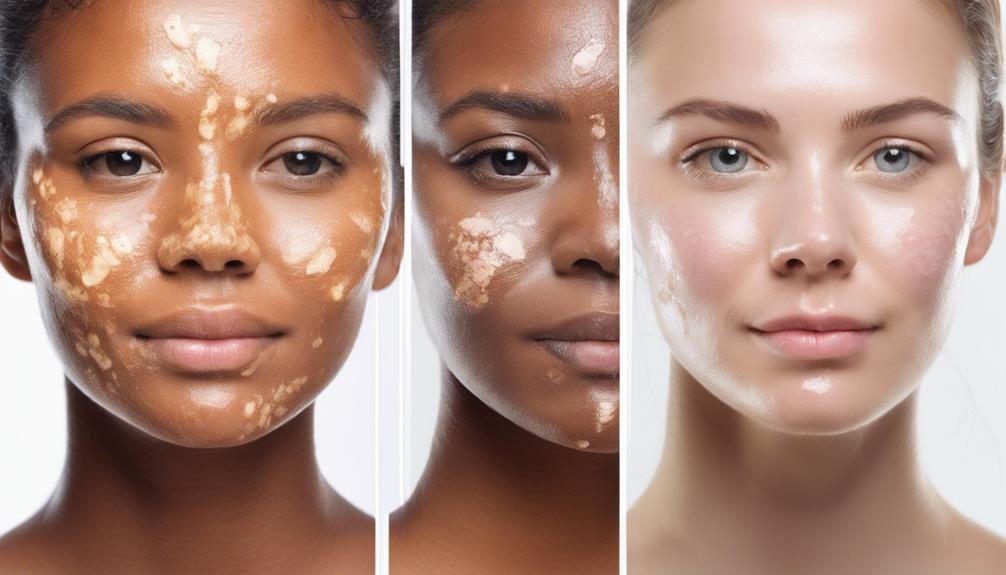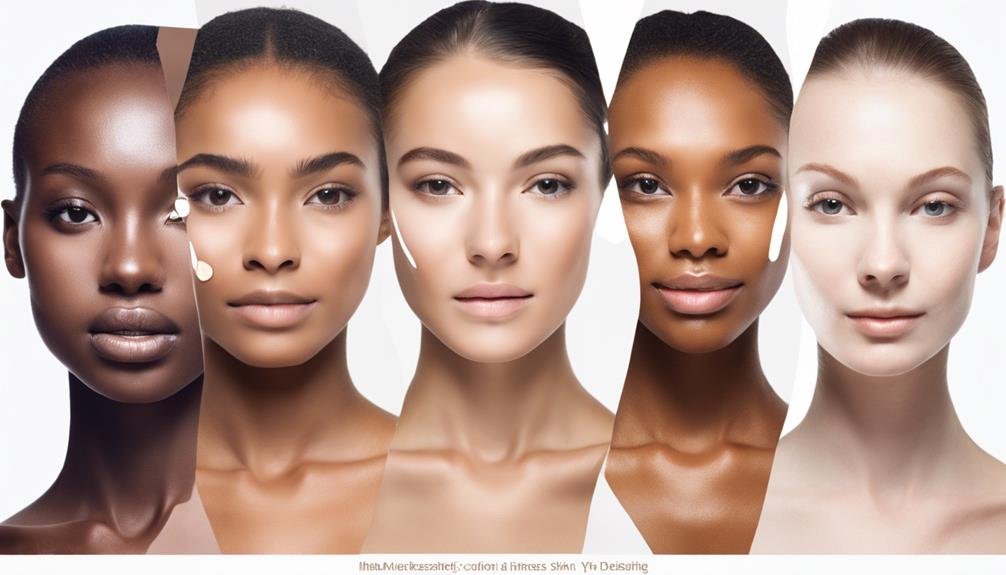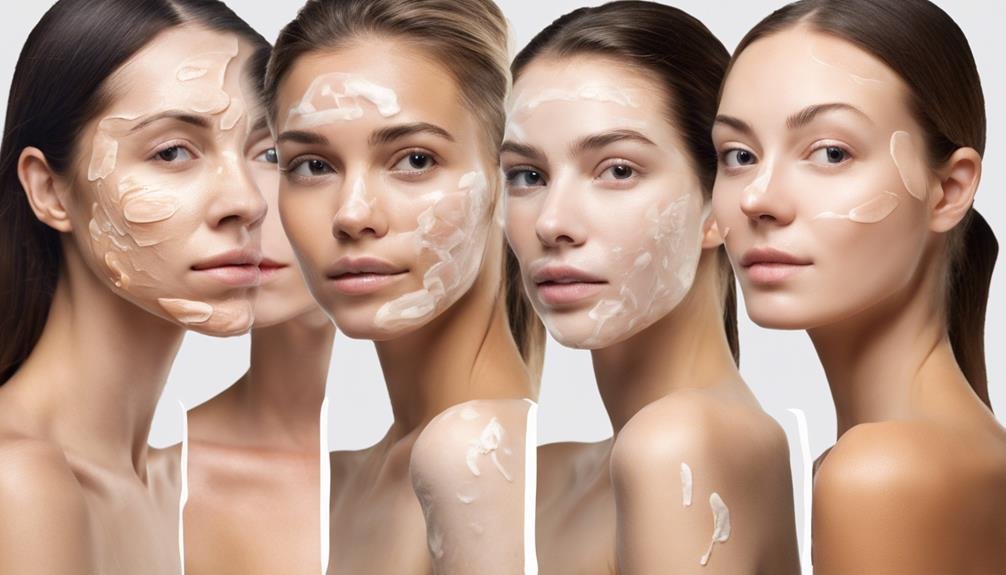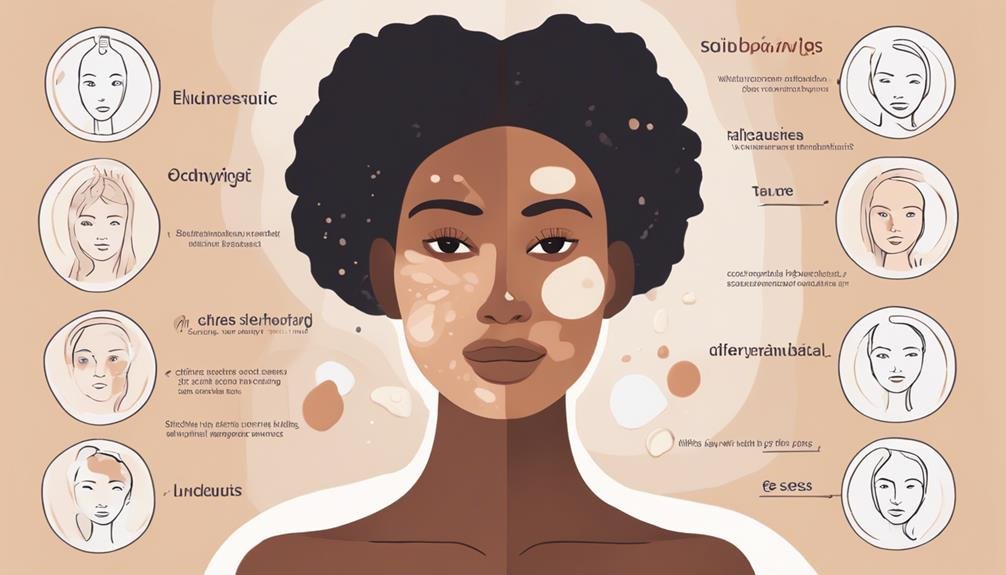When it comes to understanding your skin type, you may find yourself puzzled by the various factors at play. Your skin is unique, and identifying its specific needs can be a game-changer in your skincare routine. By recognizing the subtle cues your skin gives you, you can unlock the secret to healthy, glowing skin. So, how exactly can you pinpoint your skin type amidst the sea of skincare information out there? Let's explore some insightful ways to unravel this mystery and pave the way for a personalized skincare regimen that caters to your skin's individual requirements.
Key Takeaways
- Observe skin after cleansing to note any dryness, oiliness, or tightness.
- Consider how skin feels throughout the day to identify oily or dry areas.
- Take note of pore size and acne frequency to determine skin type.
- Seek professional advice from a dermatologist or skincare expert for accurate assessment.
- Test skincare products tailored to different skin types to see how your skin responds.
Importance of Knowing Your Skin Type
Understanding your skin type is crucial for maintaining healthy skin and achieving optimal results with your skincare routine. By identifying whether you have dry, oily, combination, sensitive, or normal skin, you can tailor your skincare products and regimen to address your specific needs effectively.
Knowing your skin type allows you to select products that won't only nourish and protect your skin but also prevent potential issues like acne, redness, or dryness. For example, if you have oily skin, using products with lightweight, oil-free formulas can help control excess sebum production and minimize breakouts.
On the other hand, if you have dry skin, opting for products with hydrating ingredients like hyaluronic acid can restore moisture and improve skin texture. Additionally, understanding your skin type enables you to make informed decisions about treatments, such as facials or chemical peels, that will benefit your skin without causing irritation or adverse reactions.
Ultimately, by knowing your skin type, you can create a skincare routine that promotes healthy, radiant skin.
Skin Type Categories
Exploring the various skin type categories is essential for tailoring your skincare routine effectively. Understanding your skin type can help you choose the right products and treatments that cater to your specific needs. Here are the four main skin type categories:
| Skin Type | Description |
|---|---|
| Normal | Well-balanced, neither too oily nor too dry. |
| Dry | Lacks moisture, can feel tight and flaky. |
| Oily | Produces excess sebum, shiny appearance, prone to acne. |
| Combination | Combination of oily and dry areas, different needs. |
Identifying which category your skin falls into can guide you in selecting the appropriate skincare products that will promote a healthy complexion. Remember, your skin type may change over time due to various factors such as age, climate, or hormonal fluctuations. By recognizing your skin type, you can establish a skincare routine that addresses your skin's unique requirements, leading to a radiant and healthy complexion.
Oily Skin Characteristics
To pinpoint if you have oily skin, observe for telltale signs such as a shiny appearance, enlarged pores, and a tendency towards acne breakouts. Oily skin is characterized by excess sebum production, leading to the skin looking shiny, especially in the T-zone (forehead, nose, and chin).
Enlarged pores are also common with oily skin, as the excess oil can cause them to appear larger. Individuals with oily skin may also experience frequent acne breakouts due to the excess oil clogging pores and creating a breeding ground for bacteria.
Managing oily skin involves using gentle cleansers to remove excess oil without stripping the skin, using oil-free moisturizers, and incorporating products with ingredients like salicylic acid to help control oil production and prevent breakouts. It's essential to strike a balance with oily skin by avoiding overly drying products that can stimulate even more oil production, leading to a vicious cycle of oiliness.
Dry Skin Characteristics
With dry skin, you may notice a lack of natural oil production, resulting in a tight or rough feeling on the skin. Dry skin can be sensitive and prone to fine lines and flakiness. Here are some common characteristics of dry skin:
| Characteristic | Description |
|---|---|
| Tightness | Skin feels tight, especially after cleansing. |
| Rough Texture | Skin may feel rough to the touch, lacking smoothness. |
| Dull Appearance | Skin may appear lackluster and may lack a natural glow. |
If you have dry skin, it's essential to use gentle, hydrating products that help restore moisture and protect the skin's barrier. Look for moisturizers with ingredients like hyaluronic acid, glycerin, and ceramides to help hydrate and soothe dry skin. Additionally, avoid harsh exfoliants and opt for products that promote hydration and nourishment. Proper skincare tailored to dry skin can help improve its overall health and appearance.
Combination Skin Characteristics
What distinguishes combination skin from other types? Combination skin is characterized by having a mix of different skin types on various parts of the face. This can make skincare a bit challenging since you need to address both oily and dry areas simultaneously.
Here are some common characteristics of combination skin:
- Oily T-zone: The forehead, nose, and chin (T-zone) tend to be oilier than the cheeks.
- Dry Cheeks: The cheeks may feel dry or tight compared to the T-zone.
- Enlarged Pores: Pores are more visible, especially in the T-zone.
- Occasional Breakouts: You may experience acne or blackheads in the oily areas, while the dry areas remain clear.
Understanding the unique needs of combination skin can help you choose products and develop a skincare routine that balances hydration and oil control effectively.
Sensitive Skin Characteristics
Sensitive skin can be a challenging skin type to manage due to its heightened reactivity to various external factors. If you have sensitive skin, you may experience redness, itching, dryness, or a burning sensation when using certain skincare products or being exposed to environmental triggers like sunlight or harsh weather conditions. Sensitive skin is often characterized by a thin epidermis layer, making it more susceptible to irritation. Individuals with sensitive skin may also have conditions like rosacea, eczema, or allergies that exacerbate their skin's reactivity.
To care for sensitive skin, it's crucial to choose gentle, fragrance-free products specifically formulated for sensitive skin types. Look for products that contain soothing ingredients like aloe vera, chamomile, or oat extract. When trying out new products, perform a patch test on a small area of skin to check for any adverse reactions before applying it to your face or body.
Additionally, avoid harsh exfoliants, alcohol-based products, and hot water, which can further irritate sensitive skin.
Simple Skin Type Test
Navigating the realm of skincare can be overwhelming, especially when determining your skin type. One simple way to figure out your skin type is by conducting a quick skin type test at home. Here are some steps to help you identify your skin type:
- Morning Observation: Take note of how your skin feels in the morning. Is it oily, dry, or normal?
- Midday Check: Around midday, observe if your skin is shiny in the T-zone (forehead, nose, and chin) or if it feels tight and dry.
- Makeup Test: Pay attention to how your makeup wears throughout the day. Does it slide off quickly or stay put?
- Nighttime Assessment: Before bed, assess if your skin feels oily, dry, or balanced after your nighttime skincare routine.
Professional Skin Analysis
When seeking a more in-depth understanding of your skin type and its specific needs, turning to a professional skin analysis can provide valuable insights.
A professional skin analysis is conducted by licensed estheticians or dermatologists who use specialized tools and techniques to assess your skin thoroughly. During the analysis, the professional will examine your skin under magnification to identify issues such as dehydration, sun damage, hyperpigmentation, and more.
They may also perform tests to determine your skin's oiliness, moisture levels, and sensitivity. By analyzing your skin in detail, they can recommend suitable products, treatments, and routines tailored to your specific skin type and concerns.
Professional skin analyses are beneficial for those looking to address persistent skin problems or enhance their skincare regimen effectively. Remember that regular professional skin analyses can help track changes in your skin over time and ensure you're using the most appropriate products and techniques for optimal skin health.
Factors Influencing Skin Type
Exploring the factors influencing your skin type can significantly impact your understanding of its unique characteristics and requirements. Here are some key factors to consider:
- Genetics: Your genetic makeup plays a significant role in determining your skin type. Traits like oil production, sensitivity, and aging tendencies can be inherited from your parents.
- Environment: External factors such as climate, pollution levels, and sun exposure can influence how your skin behaves. For example, living in a dry climate may lead to increased dryness, while high humidity can exacerbate oiliness.
- Lifestyle: Your daily habits, such as diet, sleep patterns, stress levels, and skincare routine, can affect your skin type. Poor lifestyle choices can lead to imbalances like dehydration or breakouts.
- Hormones: Hormonal fluctuations, especially during puberty, pregnancy, or menopause, can cause changes in your skin type. Hormonal acne and increased oil production are common examples.
Understanding these factors can help you better care for your skin and address any specific concerns effectively.
Skin Care Products for Each Type
Understanding your skin type is crucial for selecting the right skincare products that cater to its specific needs. For dry skin, opt for products with hydrating ingredients like hyaluronic acid or glycerin. Look for creamy cleansers and rich moisturizers to combat dryness.
Those with oily skin should choose oil-free and non-comedogenic products to prevent clogged pores. Ingredients like salicylic acid or benzoyl peroxide can help control excess oil production.
Combination skin benefits from a balanced approach, using lighter products on oily areas and more hydrating ones on dry patches. Consider gentle exfoliants to address both oily and dry areas.
If you have sensitive skin, select products that are free of fragrances and harsh chemicals. Look for calming ingredients like chamomile or aloe vera. Always perform a patch test before trying new products to avoid irritation.
Tailoring your skincare routine to your specific skin type can lead to healthier, more radiant skin.
Adjusting Your Routine
To optimize your skincare routine, it's imperative to make adjustments that align with your skin's unique needs. Here are some tips to help you tailor your routine for the best results:
- Observe Your Skin: Regularly assess how your skin looks and feels to identify any changes or issues that may require adjustments in your routine.
- Listen to Your Skin: Pay attention to how your skin reacts to different products and environmental factors to determine what works best for you.
- Seasonal Changes: Update your skincare routine according to the season to address the varying needs of your skin throughout the year.
- Consult a Professional: If you're unsure about what adjustments to make, consider seeking advice from a dermatologist or skincare specialist to create a personalized routine that suits your skin type.
Monitoring Skin Changes
Monitoring skin changes is crucial for maintaining a healthy skincare routine. Your skin is constantly evolving, influenced by factors like the environment, hormones, and lifestyle choices. By paying attention to how your skin responds to different products and external stimuli, you can adjust your skincare regimen to address any changes effectively.
To monitor your skin, start by examining it regularly in natural light. Look for any shifts in texture, color, or the appearance of blemishes. Keep track of any dryness, oiliness, redness, or sensitivity that may arise. Note down any new moles, freckles, or spots that could indicate potential skin issues.
Additionally, pay attention to how your skin feels throughout the day. Does it feel tight, itchy, or irritated? These sensations can provide valuable insights into your skin's current condition.
Frequently Asked Questions
Can Hormonal Changes Affect My Skin Type?
Hormonal changes can indeed impact your skin type. Fluctuations in hormones may lead to changes in oil production, acne, or dryness. It's essential to monitor these changes and adjust your skincare routine accordingly for optimal skin health.
How Does Diet Impact Skin Type?
Your diet plays a crucial role in determining your skin type. Consuming balanced, nutrient-rich foods can promote healthy, glowing skin. Conversely, a diet high in processed foods and sugars may lead to skin issues like acne or inflammation.
Is It Possible to Have More Than One Skin Type?
Yes, it's possible to have more than one skin type. Factors like genetics, hormones, and environmental influences can lead to a combination of characteristics. Understanding your unique skin needs can help tailor your skincare routine effectively.
Does Age Play a Role in Determining Skin Type?
Age does play a role in determining your skin type. As you get older, your skin may change due to factors like hormones, sun exposure, and natural aging processes. It's essential to adapt your skincare routine accordingly.
Can Environmental Factors Change My Skin Type Temporarily?
Sure can! External elements like weather, pollution, and skincare products can influence your skin temporarily. Pay attention to how your skin reacts to these factors to better understand its current needs and maintain a healthy complexion.
Conclusion
In conclusion, understanding your skin type is crucial for creating an effective skincare routine. Did you know that studies show that up to 70% of people may be using the wrong products for their skin type? By properly identifying whether you have oily, dry, or combination skin, you can choose the right products to achieve healthy, glowing skin. Remember to consult with a skincare professional for personalized recommendations based on your skin's unique needs.







